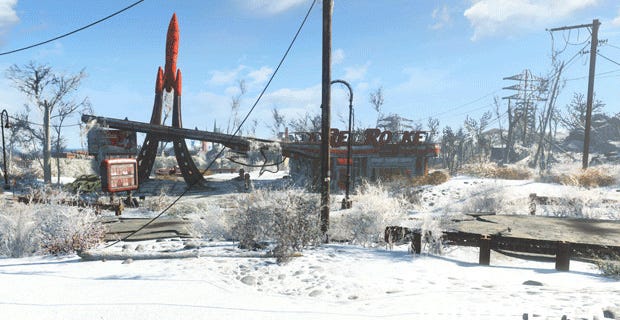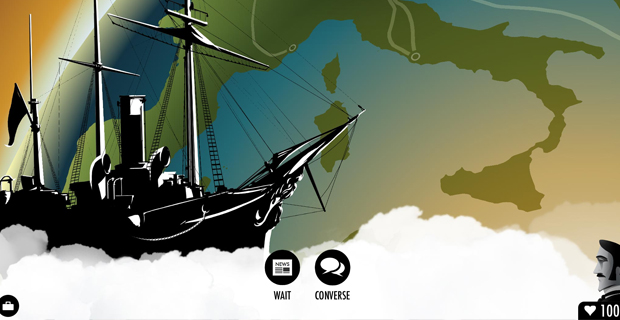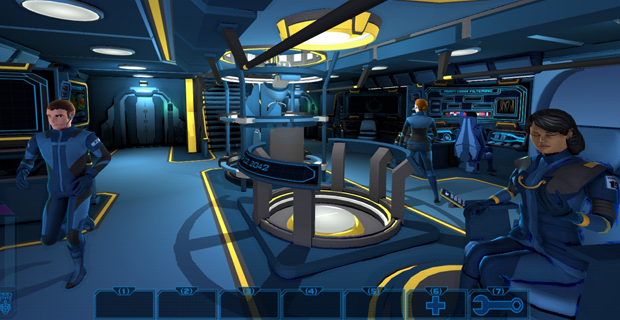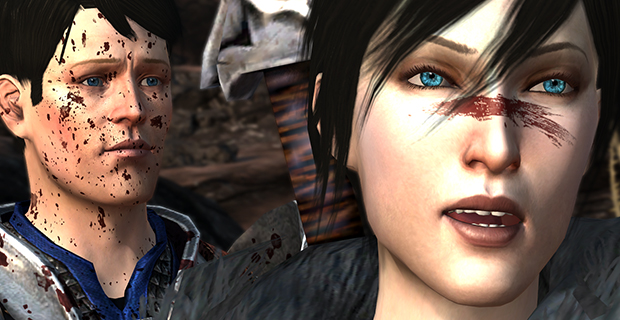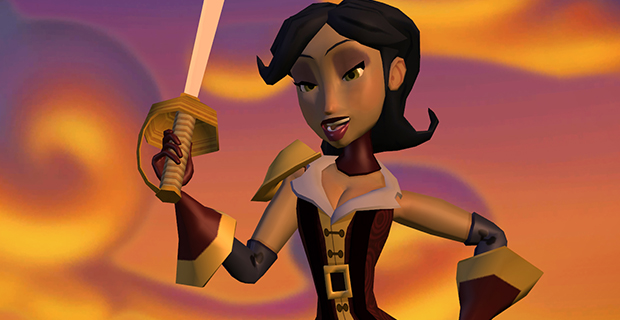The RPG Scrollbars: Time And Seasons In RPGs
And the clock strikes a critical hit
The times change, and we change with the times. Or in the case of RPGs, not. I've always felt this a bit of a shame, especially in games like World of Warcraft, where your character is officially hanging around long enough to see the leaves fall off the trees and the snow to cover up the capital cities. That's why I was quite keen on both Fallout 4 taking the time to redecorate Diamond City a little for at least Halloween and Christmas, and last week, to see a mod take the next step and give the Commonwealth a makeover for all seasons in a way that nobody's really tried since Lords of Midnight 3 way back in the 90s. Whole minutes of fun with the system clock there!
But then as now, it's hard not to start wondering how time could be given its due as more than the fire in which bad movies turn out to be even worse than they initially seemed. Maybe it could be our friend too, and in so many interesting ways.
It's obviously not that developers can't factor this kind of stuff into their games. Like a lot of 'wouldn't it be cool' features, there are good reasons not to do it. In the case of something like World of Warcraft for instance, covering most of the world in snow for a quarter of the year would render all the zones looking very samey, as well as detract from areas that draw from the various moods and palettes that they offer. No longer would the snowy road up to Ironforge offer its trademark slide from cold ice to hot metal, for instance, or the various forests be half as fun to explore in autumn.
Still, the simple fact that so few games actually do cool things with time means that it doesn't necessarily take much to stand out. Rockstar's Bully for instance offered a special Halloween event full of pranks and costumes and a Christmas equivalent shortly afterwards, and the Halloween section is one of the most memorable slices of the whole game. Similarly, while I'd argue that Blizzard really should shake things up a bit more each year, I remember the first time I did their Christmas content - going to get presents from Greatfather Winter, etc - and it was hard not to feel the warm fuzzies about that, even playing on a laptop that could barely run the damn game and looking out a rainy Yorkshire evening instead of a snowy winter wonderland.
Thinking back, it tends to be the gimmicks more than the core game functions that work the best. The problem with anything critical relying on time is that it's easy for it to be more of a gotcha than an additional slice of realism. A big timer adds pressure that's usually not welcome, especially in a game that wants you to take time to explore the fun stuff instead of just focus on the finale. I'm a big fan of Inkle Studios' 80 Days for instance, a game full of wonderful bits of story (many of which aren't apparent or even available early on), but there's always the pressure of seeing how many days you've wasted on triviality like having fun instead of barrelling across the world faster than you can comb Fogg's moustache. I do think that the speed of that game and how easy it is to finish largely counter this problem, that you can win the game and then go back and play however you want without feeling the pressure. It can lead to a very disappointing first run though, at a time when one run is all many games get.
And so it often tends to be. Very few people liked Fallout's two time limits (the water chip, and then the second one that nobody talks about), which is why Fallout 2 opted to just fake it and pretend that things were desperate without actually dropping the boot. Pathologic is intimidating enough without knowing that every day you waste screaming "What the fuck is going on?!"is likely to screw you over before you find out. Quest For Glory II is so much less pleasurable to explore when you know you're on a timer for every day that passes, and every few days brings another game-ending menace.
I don't think many people are fans of outright time limits. I know I'm not.
Even so, when I look back on some of my favourite moments, several do involve the passing of time and the ability to do stuff with that. Consortium for instance, the closest to a modern day successor to The Last Express that I've found (sequel Kickstarter coming soon, and I've got my fingers crossed for it) does some fantastic stuff with it, like a murder mystery that has to be complete by a certain point, but doesn't simply drop the boot if you fail. It's like playing through a slightly clunky SF version of 24, where disasters are always happening and piling on each other, and you're right in the middle just trying to keep up. On a smaller scale, I also like games that force you to choose at least some options under pressure, like the Telltale games, or Alpha Protocol, which did exactly the same thing... only had choices matter.
And I like the sense of a world outside the confines of my screen, even if most games that do that tend to limit themselves to one big moment to knock over-confident players off their stride, and then immediately lose interest. The start of Deus Ex: Human Revolution for instance, where taking too long pissing about the Sarif offices leads to the hostages being killed before you get there. Mass Effect 2, where wasting too much time before rescuing the captured crew leads to them being mulched in front of your face. Star Control 2, where the enemy Ur-Quan turns out to be in the middle of a civil war which resolves during your fight. Spoiler: This is not great news.
Even so, the simple fact that these kinds of moments are so memorable is often a testament to the moments themselves, but also a reminder of how rare they are. The simple fact that an NPC isn't full of shit when they warn that the world's about to end is such a strange concept that it actually counts as a plot twist. The fact that the evil overlord is doing something instead of waiting to be beaten can still be revolutionary, and is hard to object to. At least, once or twice in a game, when it doesn't mean the end of the world. Only Japanese games have traditionally thrown themselves fully into this side of things though, from the ticking clocks in games like Recettear and Way of the Samurai to the way that visual novels force you to make decisions and then live with them, on the grounds that the point is to keep coming back to find other options and outcomes instead of simply 'winning' the game, as most Western games focus on.
Despite the dramatic potential of this though, I've often actively preferred the moments that go the other way - being nice, adding to the warmth and friendliness of a world instead of making it more dangerous and cranking up the tension. I mentioned Quest for Glory 2 earlier on, and now I'll mention it again - little things like the poet Omar occasionally visiting the inn at night, or having a singer there in the evening if you return at the appropriate time. Another great one that's not really an 'RPG moment' as such, but I think I'll mention anyway, is that you can spend hours and hours in Dead Rising 2 - with a real-time clock - not fighting zombies or hunting for your daughter's desperately needed medicine or uncovering a conspiracy... but just hanging out in the zombie shelter playing strip poker. And why not? The end of the world is nigh.
Relationships in particular heavily benefit from accepting a progression of time in both design and presentation. I know that Dragon Age 2 isn't exactly a popular game (and before anyone says it, no I did not review it for PC Gamer) but I'll defend it in one way - I adore how Bioware used its span to develop not just the relationships between your character and the NPCs, but to give them all lives around the edges. Varric looking after Merill. Anders' slow descent into madness. Aveline... honestly, just Aveline, going from looking like she was going to be one of Bioware's dullest characters to really coming into her own, especially in partnership with pirate-queen Isabella. Rarely has a single game handled that journey so well, where the lines being spat around remain constant despite the sentiment shifting dramatically.
Aveline: You didn't come to my solstice dinner party.
Isabela: Look at you! Dinner parties, cooking... do you have a lace apron yet, or should I get one for you?
Aveline: Don't change the subject. I sent you an invitation, and you didn't show up.
Isabela: I thought it would be... I mean, I don't know. I just don't do family gatherings. Besides, one day you and Donnic will have children, and I'll be the last person you want around them. Imagine all the awkward questions you'd have to answer. "Mother, what's a Slattern?"
Aveline: I'll just point at you and say, "That's a slattern."
That and the other examples in the game make for the kind of character relationship that typically can only be done by stories with multiple games to play with. An individual, running story rarely allows for the characters to do much except follow on behind the hero. A few I can think of have done one or two time-shifts to reorder the board, like I-War 2 and Fable 2, but that tends to be for a time-skip between a prologue and the main game rather than something that can play with the pieces while the game is running and we're in a position to enjoy it and explore the changes at will.
(Semi-related, I remember being very impressed with what might just be an accidental success with the Tales of Monkey Island series. One episode introduces pirate hunter Morgan LeFlay, one of the more successful new characters, as hero Guybrush Threepwood's biggest fan. The gap between episodes meant that by the time they were bickering like old friends in the next chapter, it felt like they actually knew each other and had the necessary history, despite her being a brand new character to the series who'd had barely a few minutes of screentime until that point.)
There is, in short, so much more that could be done with time, for drama, for emotion, for structure, or as struck me when playing New Vegas, for keeping a game alive. Imagine for instance that you start playing it in January, but there are signs up for a big Caravan tournament due to take place in March. Or in something like Skyrim, that a carnival is coming to Whiterun town in December. That's real time, just automatically slipped into the game when the time comes and then removed once it's over - a focused reason to keep coming back to the game for specific moments. Individual plotlines evolving based on player decisions while playing through things, such as the foundation of a new city that you could see coming together month by month. Or if the Skyrim Civil War had actually been a long, extended campaign that felt like being part of a movement, an army, for the duration, instead of just a quest chain. Mods like Holidays of Skyrim baked into the experience, like so many other possibilities.
I know I'd be much keener on Season Passes for that kind of game if they were going to actually feel like a 'season' - not just a big dollup of DLC here and there, but a commitment to keeping the world alive for a year after release with small tweaks here and new bits of content there. Better yet, just make that part of the deal when you buy the game. After all, the player who's still in a game is far more likely to buy stuff.
But, ah, that kind of thing at least is going to have to wait for the next generation of open-world RPGs. Simply playing with time and factoring it in more? That's a baton that pretty much any RPG could pick up and twirl in interesting ways. Hopefully at least a few will give it a shot, because it really is odd how arguably the most persuasive of all natural laws gets left on the sidelines, even in cases where it can shine.
And at the very, very least... I'd really like to see some more snow in winter.
It's not like the real world's been serving it up this year.
